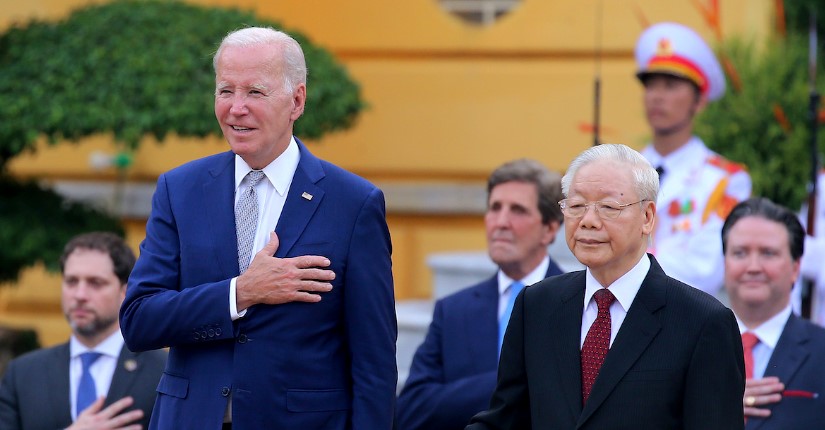President Joe Biden’s visit to Vietnam is aimed at strengthening economic ties between the United States and Hanoi as part of efforts to reduce America’s dependence on China. The two countries have upgraded their diplomatic ties to a “comprehensive strategic partnership,” which is seen as a significant move to build trust and cooperation amid growing tensions with China and to advance key technologies like semiconductor manufacturing.

Numerous American companies, including Apple and Intel, have already expanded their presence in Vietnam to diversify their supply chains, contributing to the country’s robust economic growth. During Biden’s visit, the White House announced a major deal between Boeing and Vietnam Airlines worth $7.8 billion, expected to support over 30,000 jobs in the United States. This deal involves Vietnam Airlines purchasing 50 Boeing 737 Max jets.
Biden has met with Vietnamese leaders to promote a technology-focused Vietnamese economy and discuss regional stability. The United States has been increasing its trade with Vietnam, with imports reaching nearly $127.5 billion in 2022, making Vietnam America’s eighth-largest trading partner.
The backdrop for this deepening economic relationship is the concept of “friend-shoring,” where supply chains are diversified to reduce reliance on countries with geopolitical tensions, such as China. Factors like rising labor costs and an uncertain operating environment in China have driven companies to consider alternative manufacturing hubs, including Vietnam.
According to a report by Rabobank, as many as 28 million Chinese jobs relying on exports to the West could be at risk due to this shift in supply chains, with around 300,000 low-tech manufacturing jobs expected to move to Vietnam.
Vietnam’s attractive attributes include lower wages, a young workforce, and a robust consumer base. However, the demand for manufacturing in Vietnam has outstripped supply, leading to some challenges.
Vietnam’s role in the semiconductor industry is of particular importance, given the tensions between the United States and China in this sector. Both countries are seeking to enhance their capabilities, and Vietnam is viewed as a reliable partner for semiconductor supply chains.
Intel, for example, has committed $1.5 billion to a major facility near Ho Chi Minh City, set to be its largest assembly and test facility globally. Expectations are that more investments in technology-related fields will follow as ties between Washington and Hanoi strengthen.
Despite projections of a slight slowdown in Vietnam’s growth, it remains one of the fastest-growing economies globally, with a forecasted growth rate of 5.8%. This is considerably higher than the global average of 3%, making Vietnam an attractive prospect for corporations seeking growth opportunities.
However, some businesses remain cautious due to concerns about Vietnamese tech regulations and infrastructure limitations compared to China. Vietnam, like China, is an authoritarian one-party state, which raises political considerations for companies.
Nonetheless, Vietnam is seen as a cost-effective alternative to manufacturing in China, making it a popular choice for businesses looking to diversify their supply chains. Many Chinese suppliers have also established operations in Vietnam in response to US tariffs, making the transition smoother for various sectors.
In conclusion, President Biden’s visit to Vietnam signifies the growing importance of the economic relationship between the two countries, driven by the need to reduce reliance on China and secure alternative supply chain options, particularly in critical industries like semiconductors. Vietnam’s rapid economic growth and attractive attributes make it an appealing destination for American businesses
